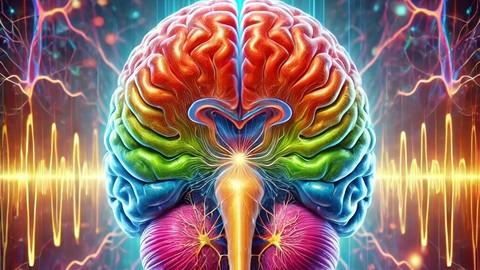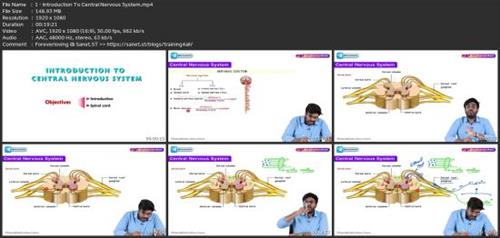- Thread Starter
- #1
Certificate Course In Physiology Of Central Nervous System

What you'll learn
Learn the fundamental structure and functions of the CNS, including brain and spinal cord, as a basis for understanding neural processes.
Describe synaptic transmission, action potentials, and neurotransmitter functions essential for CNS communication.
Examine sensory and motor pathways in the CNS, covering sensory processing and motor response generation.
Explore CNS roles in regulating sleep, emotion, learning, and memory, with focus on their physiological importance.
Requirements
This Physiology of the Central Nervous System course is accessible to learners from all backgrounds, with no strict prerequisites. However, a few foundational skills and interests can enhance the learning experience. A basic understanding of biology can be helpful, particularly general concepts related to cellular function and human anatomy, though this knowledge is not mandatory. Curiosity about how the brain and nervous system operate is also beneficial, as it adds context to complex topics. It's recommended to have note-taking supplies-whether a notebook or digital tool-to organize essential concepts as the course progresses. Above all, an eagerness to explore the intricacies of the human nervous system is the most valuable asset. This course is designed to be beginner-friendly, allowing learners from diverse educational backgrounds to join, engage, and succeed.
Description
The Physiology of the Central Nervous System course offers an in-depth look into the intricate workings of the human CNS, designed for learners eager to understand how our brain and spinal cord function to regulate every aspect of our lives. Starting with the fundamentals of CNS structure, we'll explore the unique roles of various brain regions and pathways that process information, generate movement, and respond to stimuli. This course introduces essential concepts in neuronal communication, where we discuss how neurons transmit signals through synaptic transmission, action potentials, and neurotransmitters.We'll also cover sensory and motor pathways, detailing how sensory information from our environment is processed and transformed into coordinated motor responses. Additionally, the course delves into CNS regulatory mechanisms, exploring how brain functions regulate sleep, emotion, memory, and learning, crucial for both everyday function and clinical understanding.Learners will gain practical insights into the physiological underpinnings of these complex processes, providing a foundation for advanced studies in healthcare, neuroscience, and allied health fields. This course is beginner-friendly, requiring no prior specialized knowledge, and is ideal for students, healthcare professionals, and anyone interested in understanding the central nervous system's role in human physiology. By the end of the course, learners will be equipped with the knowledge to appreciate and apply key CNS principles in academic, clinical, or personal contexts.
Overview
Section 1: Physiology of Central Nervous System
Lecture 1 Introduction To Central Nervous System
Lecture 2 Sensory nervous system
Lecture 3 Receptors
Lecture 4 Reflexes
Lecture 5 Touch Receptors
Lecture 6 Somatosensory Pathways
Lecture 7 Gate-control Theory
Lecture 8 Lower motor Neurons
Lecture 9 Descending motor pathways
Lecture 10 UMN and LMN Lesions
Lecture 11 Syringomyelia
Lecture 12 Basal Ganglia
Lecture 13 Electroencephalography
Lecture 14 Hypothalamus
Lecture 15 Sleep Physiology
Lecture 16 Physiology of Taste
Lecture 17 Physiology of Vision
Lecture 18 Physiology of Hearing and Balance
This Physiology of the Central Nervous System course is ideal for anyone curious about the brain and nervous system, especially students and professionals in healthcare, biology, psychology, and neuroscience. It's perfect for medical and pre-med students looking to deepen their understanding of CNS physiology, as well as those in allied health fields like nursing or physiotherapy who want a foundational knowledge of how the central nervous system influences bodily functions. Additionally, educators, researchers, and even curious beginners with a strong interest in human physiology will find valuable insights into how our brains process information, control movement, and regulate essential body functions. With beginner-friendly content, this course caters to learners at all levels, offering practical, applicable knowledge for academic, professional, or personal enrichment.

Say "Thank You"
rapidgator.net:
ddownload.com:

Published 10/2024
MP4 | Video: h264, 1920x1080 | Audio: AAC, 44.1 KHz
Language: English | Size: 2.67 GB | Duration: 4h 46m
CNS Physiology made easy
MP4 | Video: h264, 1920x1080 | Audio: AAC, 44.1 KHz
Language: English | Size: 2.67 GB | Duration: 4h 46m
CNS Physiology made easy
What you'll learn
Learn the fundamental structure and functions of the CNS, including brain and spinal cord, as a basis for understanding neural processes.
Describe synaptic transmission, action potentials, and neurotransmitter functions essential for CNS communication.
Examine sensory and motor pathways in the CNS, covering sensory processing and motor response generation.
Explore CNS roles in regulating sleep, emotion, learning, and memory, with focus on their physiological importance.
Requirements
This Physiology of the Central Nervous System course is accessible to learners from all backgrounds, with no strict prerequisites. However, a few foundational skills and interests can enhance the learning experience. A basic understanding of biology can be helpful, particularly general concepts related to cellular function and human anatomy, though this knowledge is not mandatory. Curiosity about how the brain and nervous system operate is also beneficial, as it adds context to complex topics. It's recommended to have note-taking supplies-whether a notebook or digital tool-to organize essential concepts as the course progresses. Above all, an eagerness to explore the intricacies of the human nervous system is the most valuable asset. This course is designed to be beginner-friendly, allowing learners from diverse educational backgrounds to join, engage, and succeed.
Description
The Physiology of the Central Nervous System course offers an in-depth look into the intricate workings of the human CNS, designed for learners eager to understand how our brain and spinal cord function to regulate every aspect of our lives. Starting with the fundamentals of CNS structure, we'll explore the unique roles of various brain regions and pathways that process information, generate movement, and respond to stimuli. This course introduces essential concepts in neuronal communication, where we discuss how neurons transmit signals through synaptic transmission, action potentials, and neurotransmitters.We'll also cover sensory and motor pathways, detailing how sensory information from our environment is processed and transformed into coordinated motor responses. Additionally, the course delves into CNS regulatory mechanisms, exploring how brain functions regulate sleep, emotion, memory, and learning, crucial for both everyday function and clinical understanding.Learners will gain practical insights into the physiological underpinnings of these complex processes, providing a foundation for advanced studies in healthcare, neuroscience, and allied health fields. This course is beginner-friendly, requiring no prior specialized knowledge, and is ideal for students, healthcare professionals, and anyone interested in understanding the central nervous system's role in human physiology. By the end of the course, learners will be equipped with the knowledge to appreciate and apply key CNS principles in academic, clinical, or personal contexts.
Overview
Section 1: Physiology of Central Nervous System
Lecture 1 Introduction To Central Nervous System
Lecture 2 Sensory nervous system
Lecture 3 Receptors
Lecture 4 Reflexes
Lecture 5 Touch Receptors
Lecture 6 Somatosensory Pathways
Lecture 7 Gate-control Theory
Lecture 8 Lower motor Neurons
Lecture 9 Descending motor pathways
Lecture 10 UMN and LMN Lesions
Lecture 11 Syringomyelia
Lecture 12 Basal Ganglia
Lecture 13 Electroencephalography
Lecture 14 Hypothalamus
Lecture 15 Sleep Physiology
Lecture 16 Physiology of Taste
Lecture 17 Physiology of Vision
Lecture 18 Physiology of Hearing and Balance
This Physiology of the Central Nervous System course is ideal for anyone curious about the brain and nervous system, especially students and professionals in healthcare, biology, psychology, and neuroscience. It's perfect for medical and pre-med students looking to deepen their understanding of CNS physiology, as well as those in allied health fields like nursing or physiotherapy who want a foundational knowledge of how the central nervous system influences bodily functions. Additionally, educators, researchers, and even curious beginners with a strong interest in human physiology will find valuable insights into how our brains process information, control movement, and regulate essential body functions. With beginner-friendly content, this course caters to learners at all levels, offering practical, applicable knowledge for academic, professional, or personal enrichment.
Screenshots

Say "Thank You"
rapidgator.net:
You must reply in thread to view hidden text.
ddownload.com:
You must reply in thread to view hidden text.
